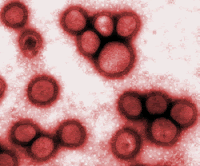
Given all the scary publicity about canine influenza, I would like to make a few things clear.
Don’t Panic!
It is extremely unlikely that a healthy, adult, pet dog will develop the severe and deadly form of the canine influenza virus.
Overall, canine influenza is no more a threat to your dog than an infection from Bordetella (the bacteria associated with “kennel cough”). While it’s true that about 80% of all dogs exposed to the virus will become infected, the vast majority of these experience mild symptoms similiar to a human head cold which resolve with simple supportive care. About 20% of those dogs exposed will clear the infection without any signs of illness.
Infected dogs may develop such clinical signs as coughing, sneezing, lethargy, decreased appetite, fever and a runny nose.
Often mild symptoms such as coughing and sneezing can resolve themselves after just a few days. If treatment is warranted, then supportive care consisting of antibiotics and possibly intravenous fluids would be indicated. A very small percentage of dogs can develop pneumonia, which requires more aggressive therapy.
At-risk canine populations
Shelter dogs and racing greyhounds are at a greater risk of contracting the severe form of canine influenza, due to the close proximity of their crates and the increased stress levels these dogs experience. As with human flu, the very young or very old are also at increased risk. Again, it is rare that a healthy, adult, pet dog will develop the severe form of this virus.

In its severe form, canine influenza is characterized by a rapid onset of hemorrhagic pneumonia with high fevers, difficulty breathing and coughing up blood. In these cases death can occur within four to six hours of presentation.
Scary as this sounds, it’s important to remember that, even in these very high-risk populations, the mortality rate is only 5-8%. That means that almost all dogs affected do recover with treatment.
Steps for prevention
You can help protect your dog with these simple preventive steps:
· At the dog park or doggie day care, avoid any contact with dogs that are coughing and sneezing.
· Keep a watchful eye out: If your dog starts coughing or sneezing and acting lethargic, see your veterinarian to discuss diagnostic and treatment options.
· If your dog shows any of these upper respiratory signs, limit your dog’s socializing -- steer clear of the dog park and doggie day care until these symptoms are gone.
Although a vaccine is available, Friendship does not recommend or carry it. There are multiple reasons for this:
· Though initial clinical trials showed the vaccine to be safe, the number of dogs tested was relatively small (only 746). As with many other medications, we do not know the full potential for reactions or complications until the vaccine is used in much larger number in the general population.
· The vaccine cannot prevent your pet from becoming infected if exposed to the virus. Instead the vaccine will only reduce the severity of clinical signs.
Given these facts, we do not recommend that all dogs get vaccinated for a disease that, for the great majority of pet dogs, is mild and does not cause a life-threatening illness.









No comments:
Post a Comment